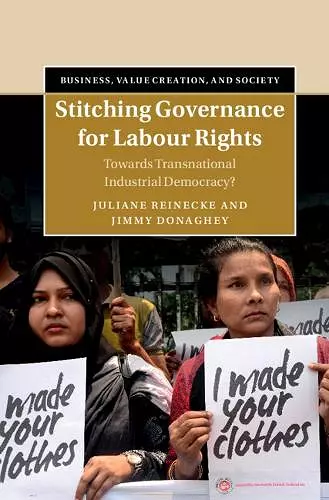Stitching Governance for Labour Rights
Towards Transnational Industrial Democracy?
Jimmy Donaghey author Juliane Reinecke author
Format:Hardback
Publisher:Cambridge University Press
Published:16th Mar '23
Currently unavailable, and unfortunately no date known when it will be back
This hardback is available in another edition too:
- Paperback£29.99(9781108708388)

This book shows how the Rana Plaza disaster led to voluntary labour governance initiatives based on a model of transnational industrial democracy.
Transnational labour governance is in urgent need of a new paradigm of democratic participation. Using responses to the 2013 Rana Plaza disaster in Bangladesh, this book charts innovative approaches to establish more meaningful representation of workers in global supply chains.Transnational labour governance is in urgent need of a new paradigm of democratic participation, with those who are most affected - typically workers - placed at the centre. To achieve this, principles of industrial democracy and transnational governance must come together to inform institutions within global supply chains. This book traces the development of 'transnational industrial democracy', using responses to the 2013 Rana Plaza disaster as the empirical context. A particular focus is placed on the Bangladesh Accord and the JETI Workplace Social Dialogue programme. Drawing on longitudinal field research from 2013–2020, the authors argue that the reality of modern-day supply chain capitalism has neither optimal institutional frameworks nor effective structures of industrial relations. Informed by principles of industrial democracy, the book aims at enhancing emerging forms of private transnational governance as second-best institutions.
'Through their detailed empirical work on the ground in Bangladesh and their thoughtful theorising on democratic representation, the authors show that what seems like an unsolveable problem - achieving better labour standards in the global garment industry - hinges on one core ingredient: the voice of workers. Their book sheds light on who can legitimately take up this role in the absence of institutionalised structures of representation, taking us through the complex and fragile alliances on different levels that have emerged in the aftermath of the Rana Plaza disaster. A great read for anyone interested in the intricacies of making global supply chains more sustainable, be it from an industrial relations, a governance or a management perspective.' Elke Schüßler, Head of Institute of Organizational Science, Johannes Kepler University Linz
'Workers have a right to stay alive at work. Unforgivably, it seems that the global brands that now dominate the world economy only 'woke up' to this fundamental right when over a thousand workers died in the Rana Plaza factory collapse. This book is a wake-up call for everyone, from international agencies to national governments, from producers to consumers. Reinecke and Donaghey demonstrate how production and consumption relations have been 'disconnected' by global supply chains, and they make a compelling democratic case for these relations to be 'stitched back together'. Although the market-driven form of industrial democracy that characterised the Accord ultimately fell short, this book is an essential read for all those who are trying to stitch national and international labour regulation back together.' Peter Turnbull, Professor of Management & Industrial Relations, University of Bristol, UK, and President, British Universities Industrial Relations Association (BUIRA)
ISBN: 9781108486873
Dimensions: 235mm x 155mm x 18mm
Weight: 570g
220 pages